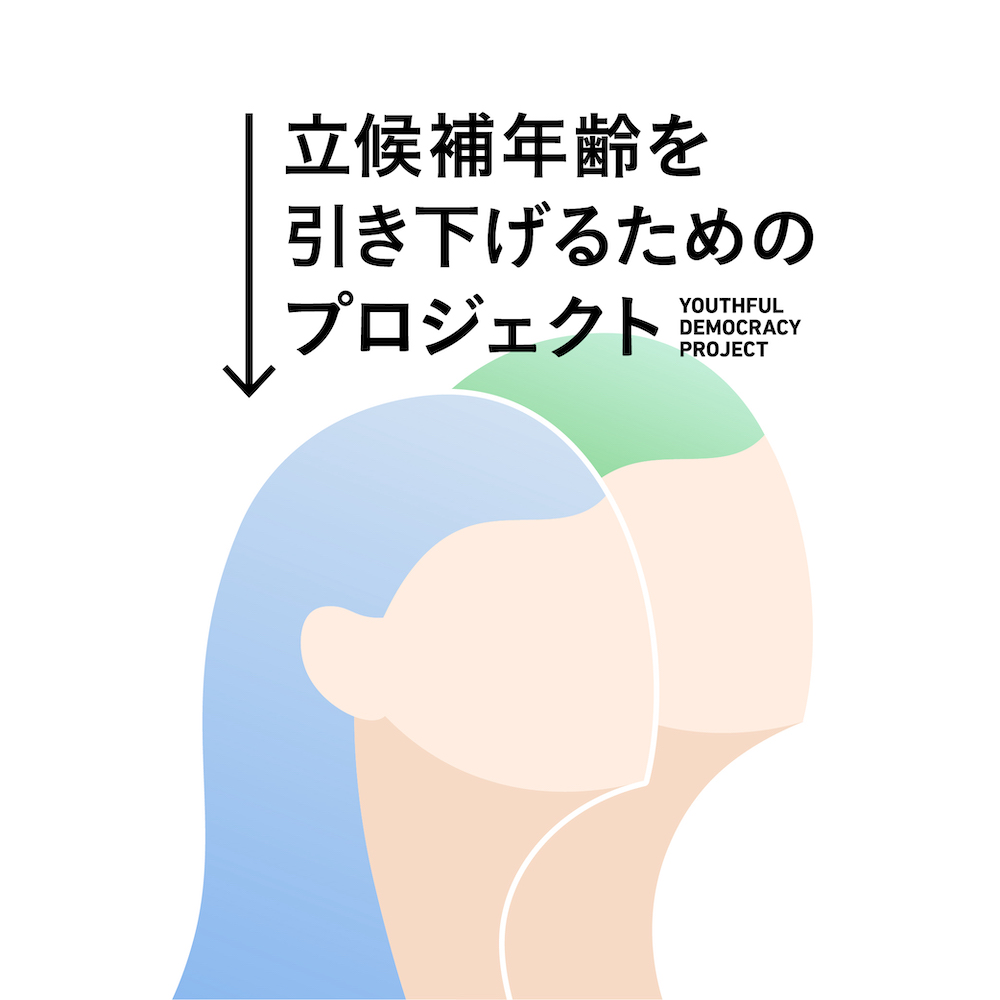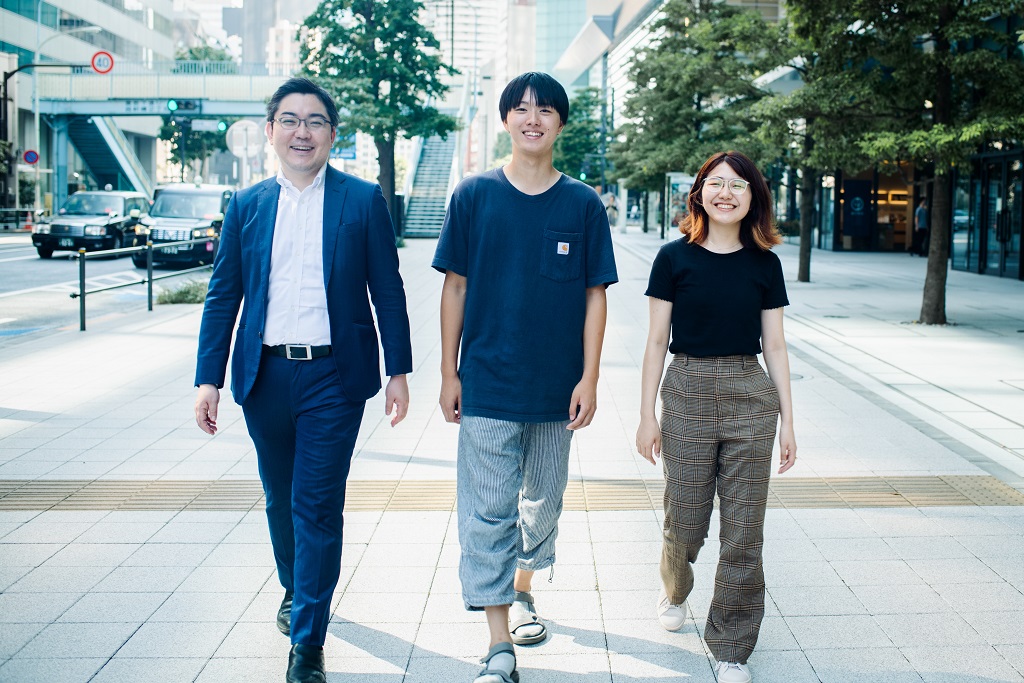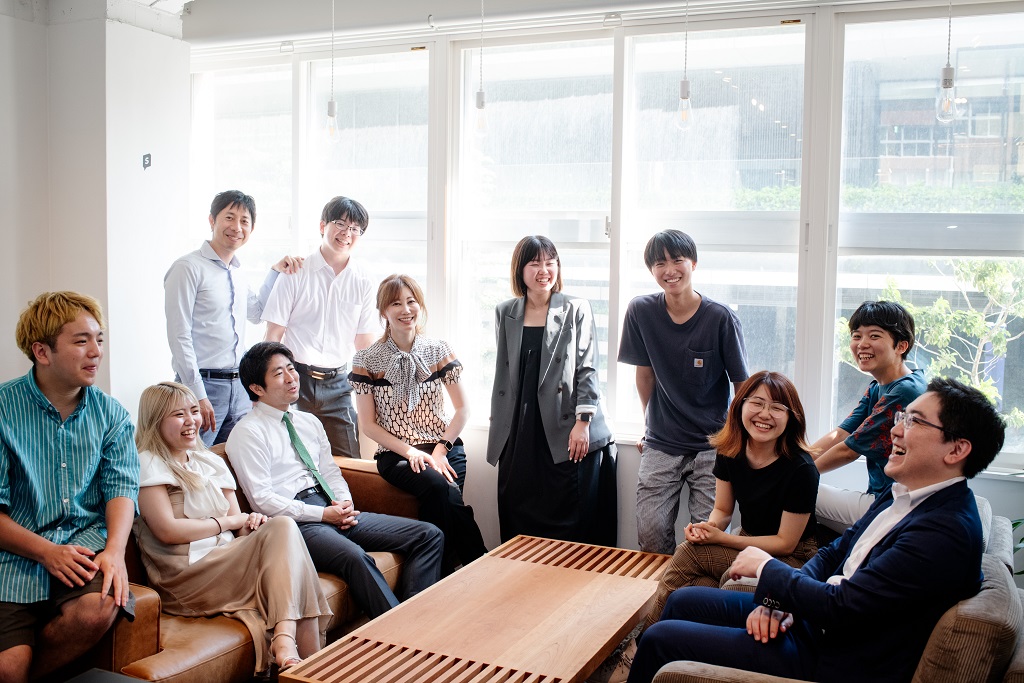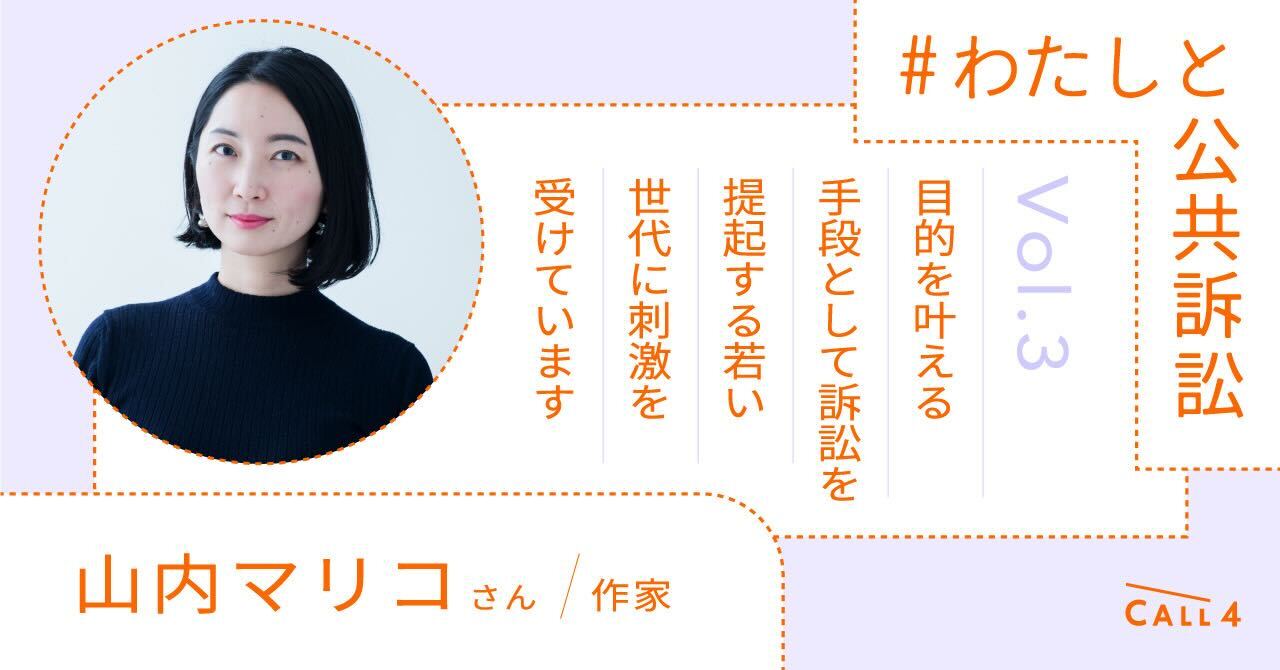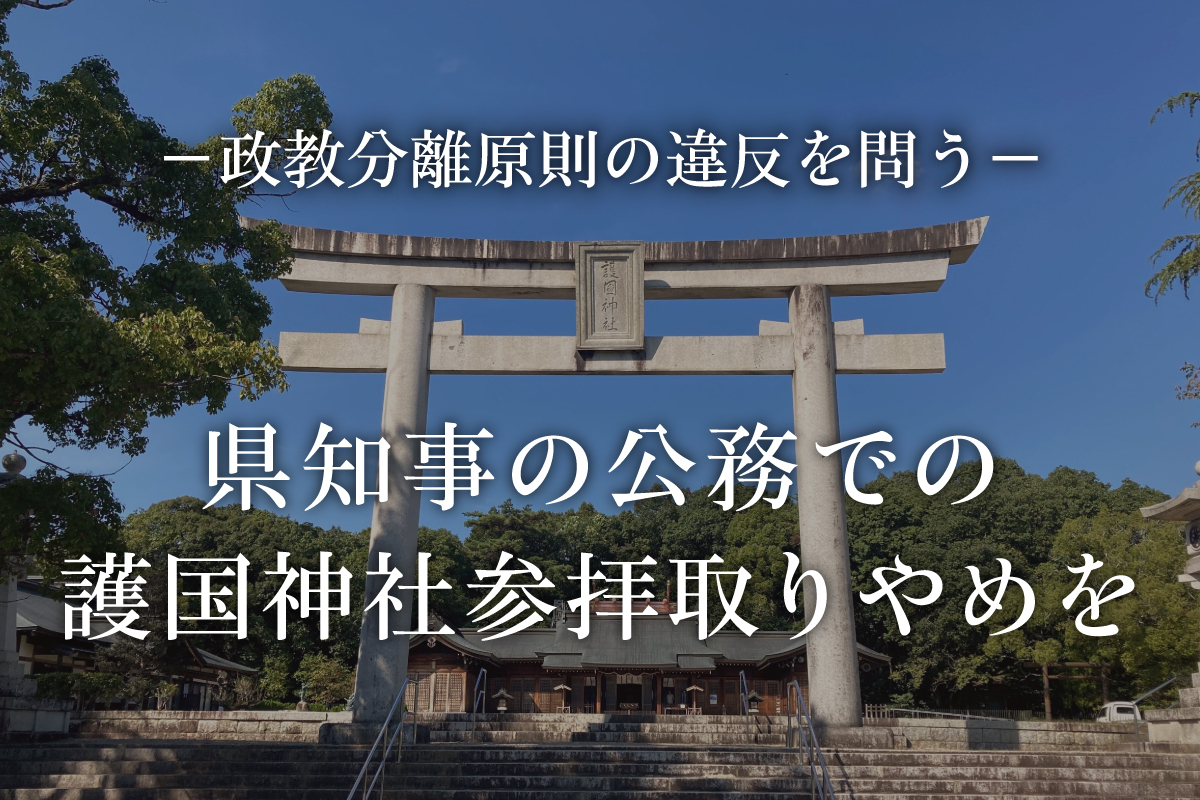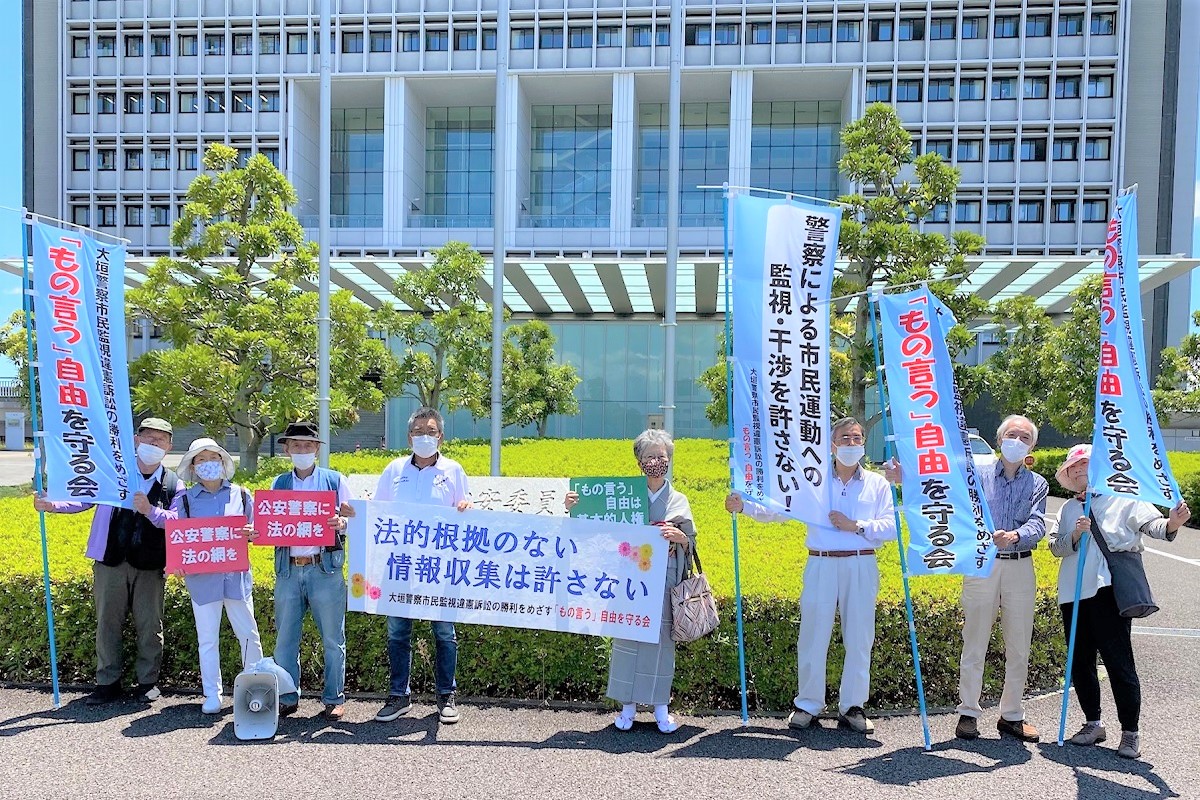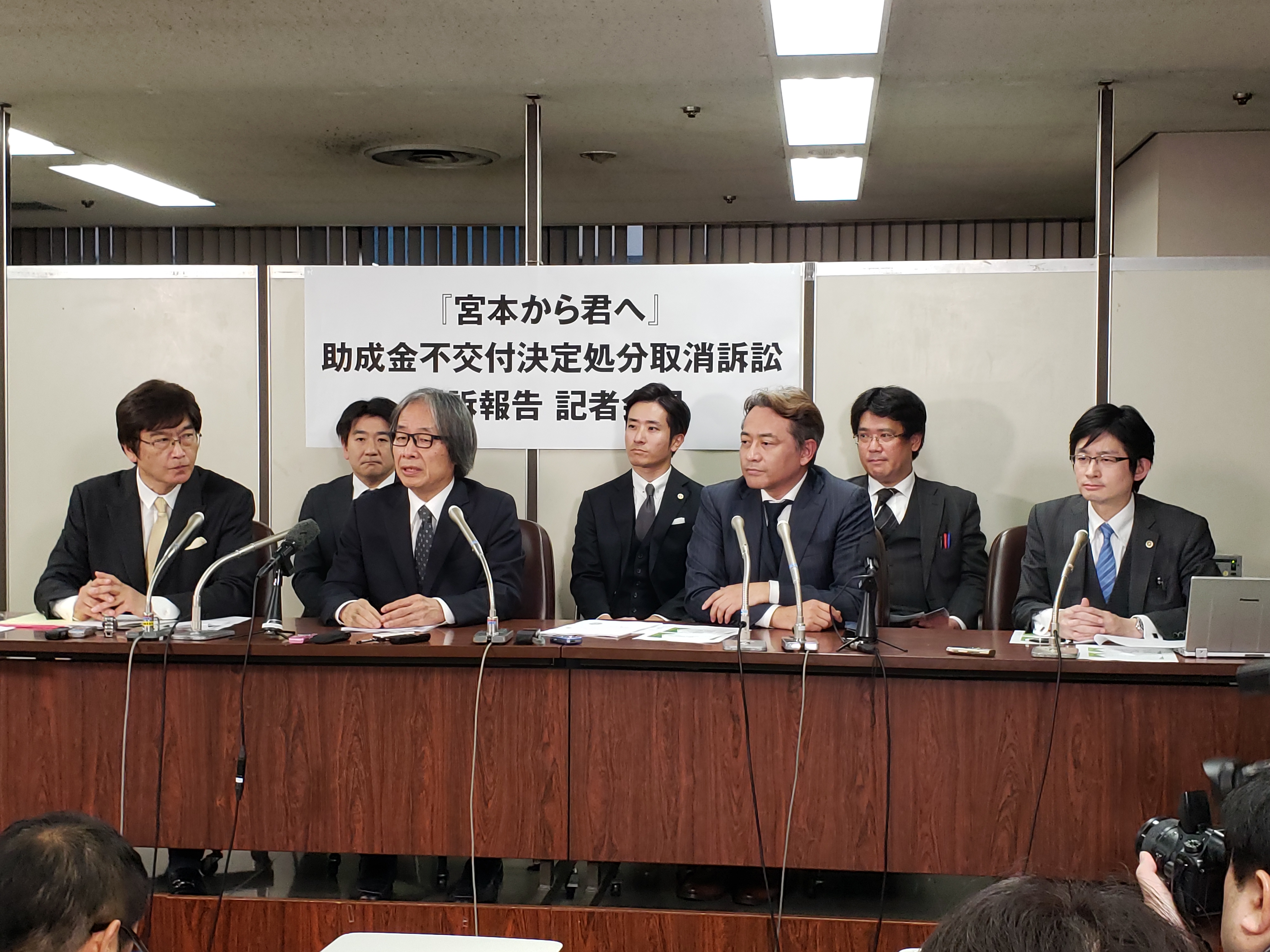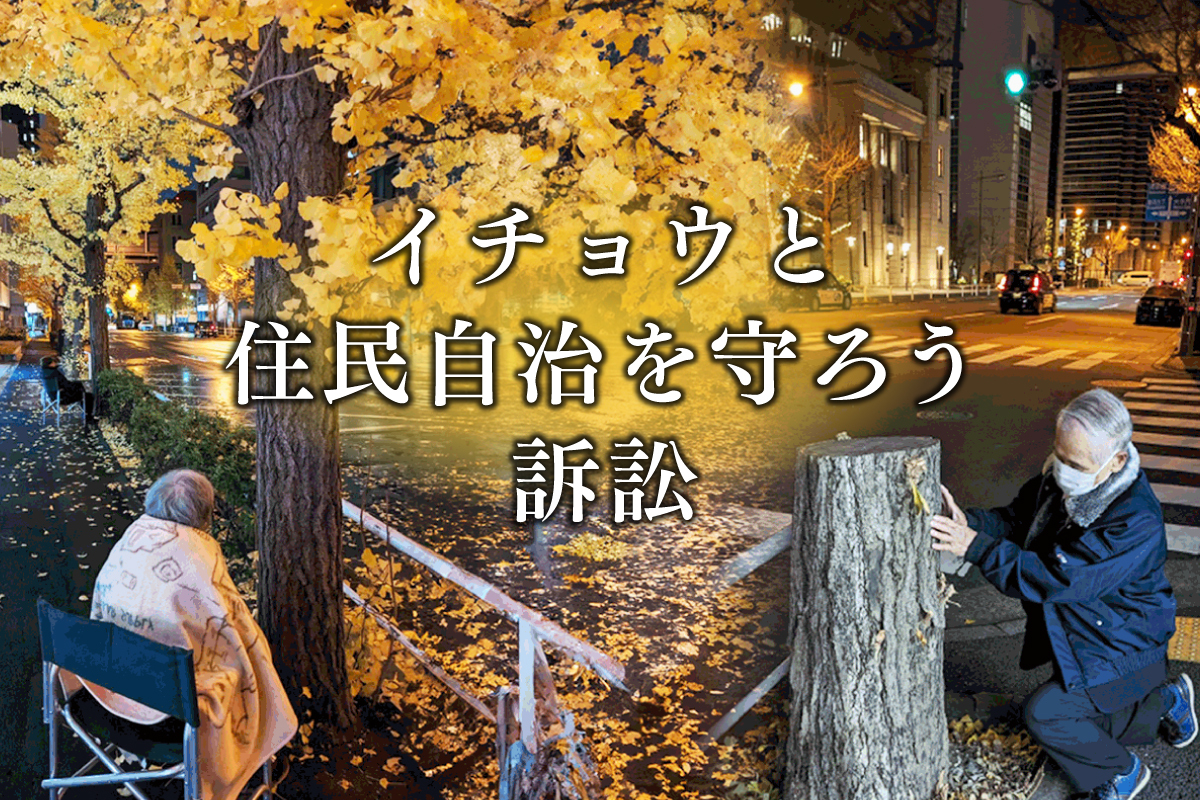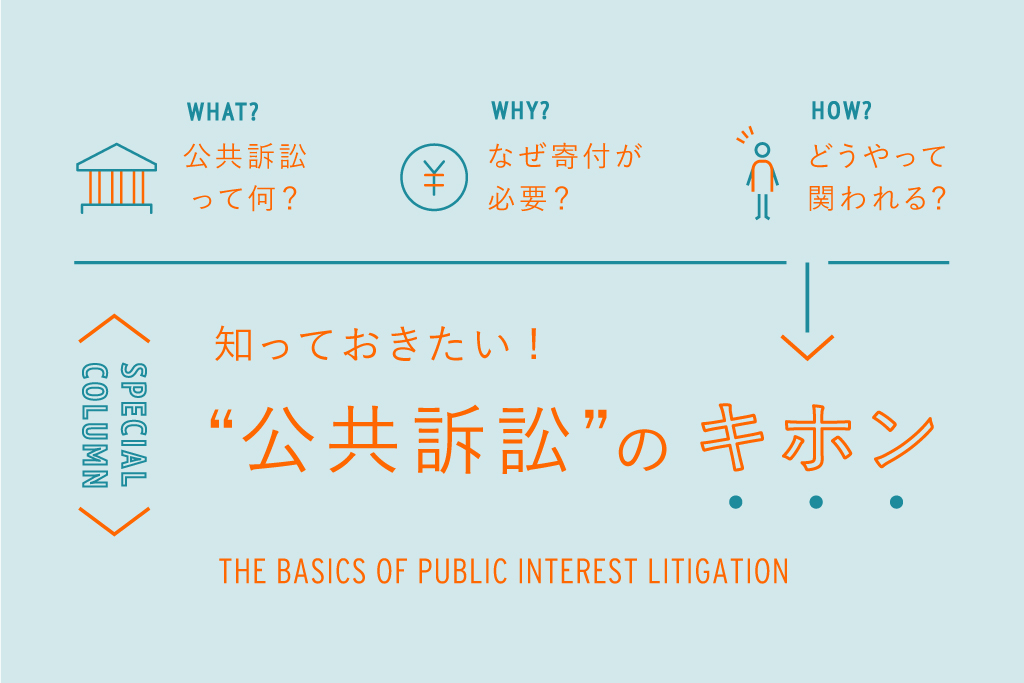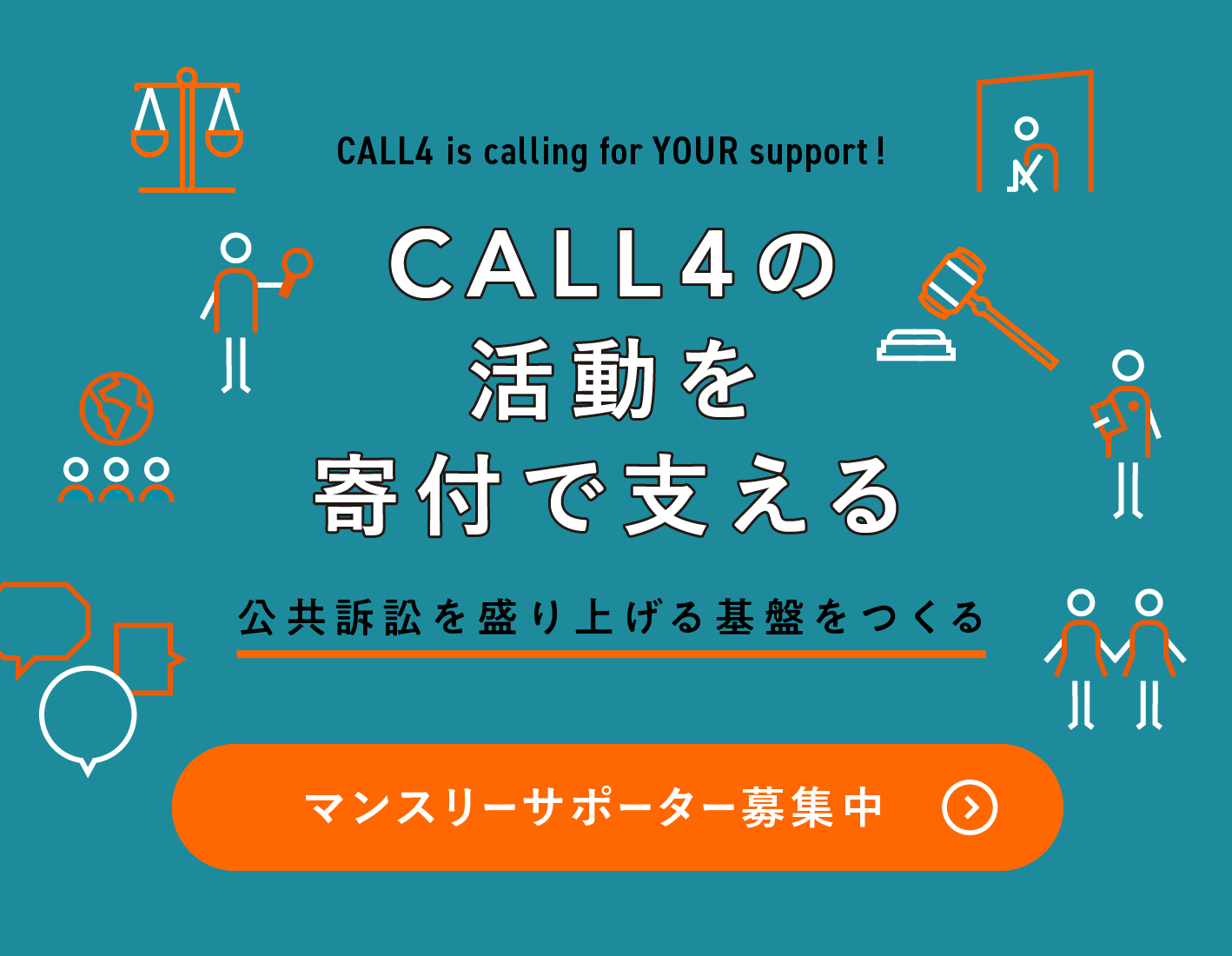立候補年齢引き下げ訴訟 Lawsuit for Lowering the Age of Candidacy
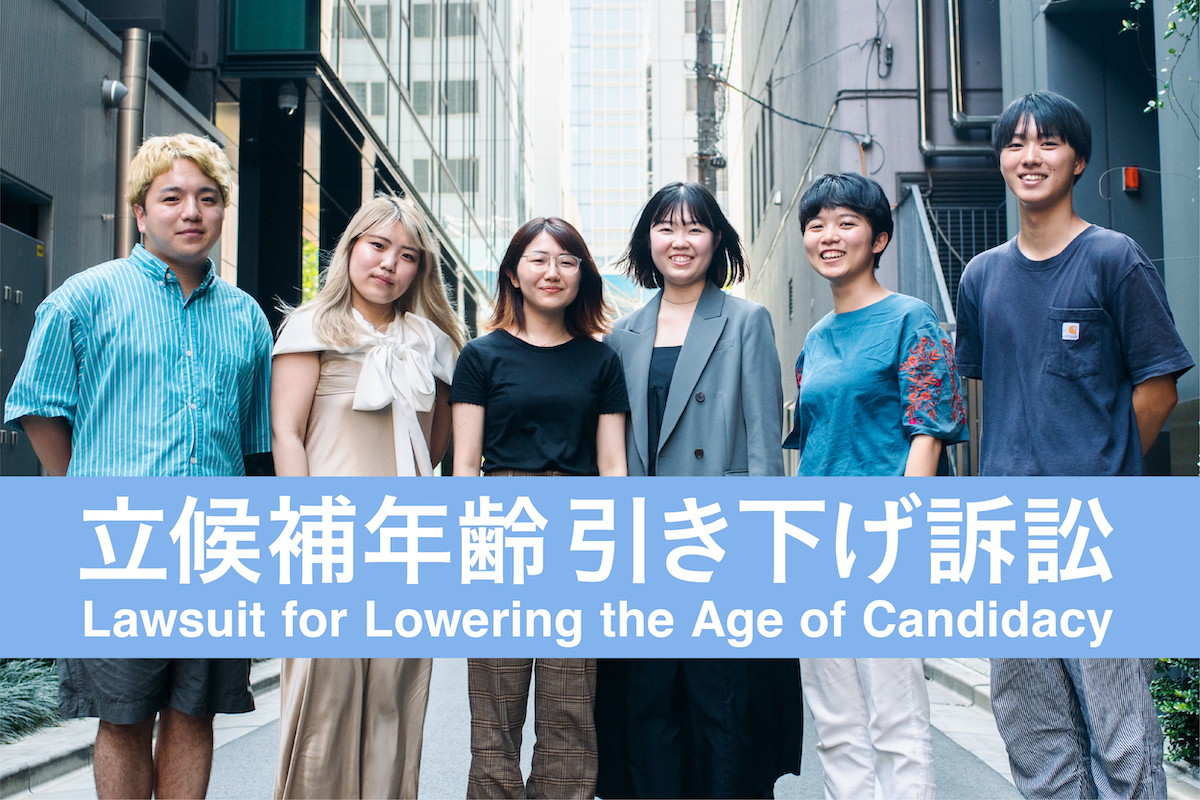
日本が直面する少子高齢社会、中高年が多くを占める政治の場に、若い世代の声はなかなか届きません。戦後変わらない立候補年齢は若者の政治参加を制限し、社会の一員として政治に関わることを難しくしています。長期的な視点を持った10代・20代の声が届く政治は、日本をもっと持続可能で、生きやすい社会にします。若い世代の声が届く社会に向けて、私たちは立候補年齢の引き下げを提案します。 In Japan’s aging society, where the older generation dominates the political arena, it is difficult for the voices of the younger generation to be heard. The unchanged age of candidacy since the post-war era restricts young people’s political participation and makes it difficult for them to engage in politics. A politics that embraces the voices of teenagers and people in their 20s with a long-term perspective will create a more sustainable and livable society in Japan. In pursuit of a society where the voices of the younger generation are heard, we propose lowering the age of candidacy.
なぜ現在の立候補年齢が問題なのか
私たちは裁判を通して立候補年齢(被選挙権)の引き下げを求めます。現在、日本の立候補年齢(被選挙権)は戦後変わらず25歳と30歳です。
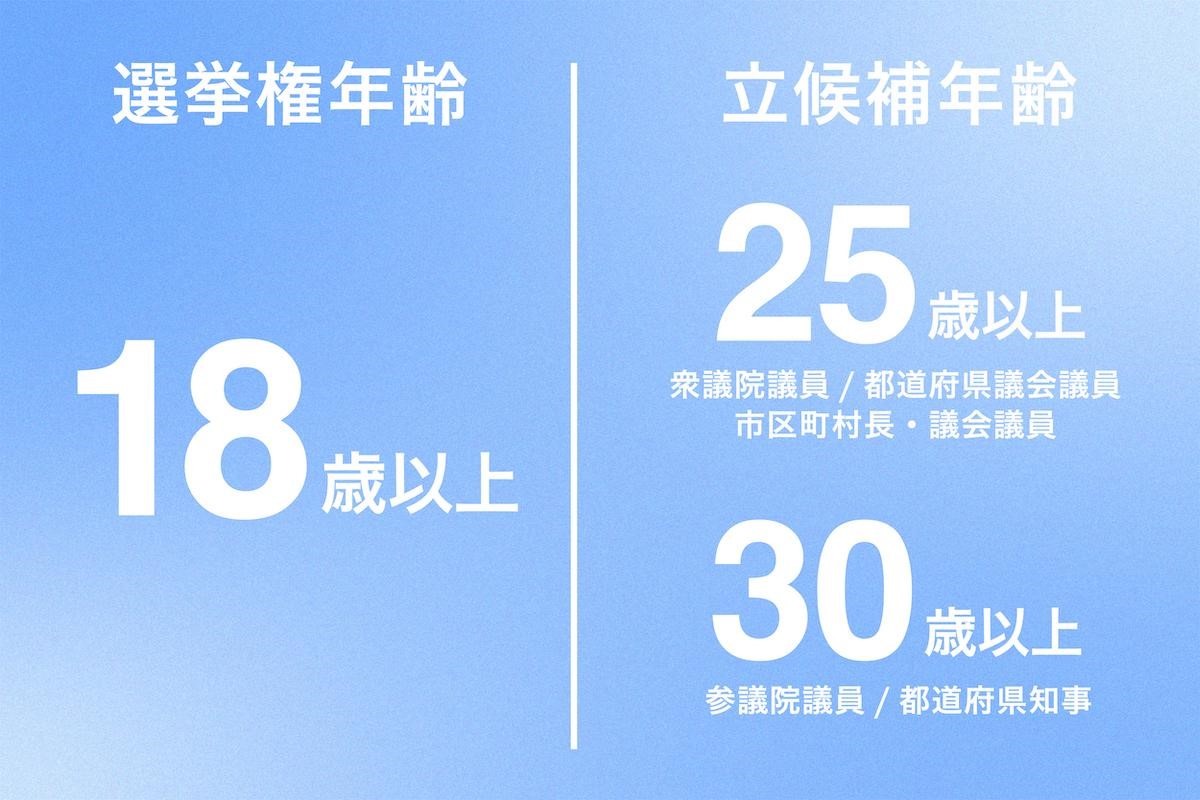
戦後70年以上が経ち、社会は大きく変わりました。2016年には公職選挙法が改正され18歳から投票ができるようになりましたが、立候補年齢は変えられることなく、若者の直接的な政治参加を制限し続けています。さらに指摘すべきは、なぜ立候補年齢が25歳と30歳に設定されなければならないのか、その合理的理由を誰も説明することができないということです。
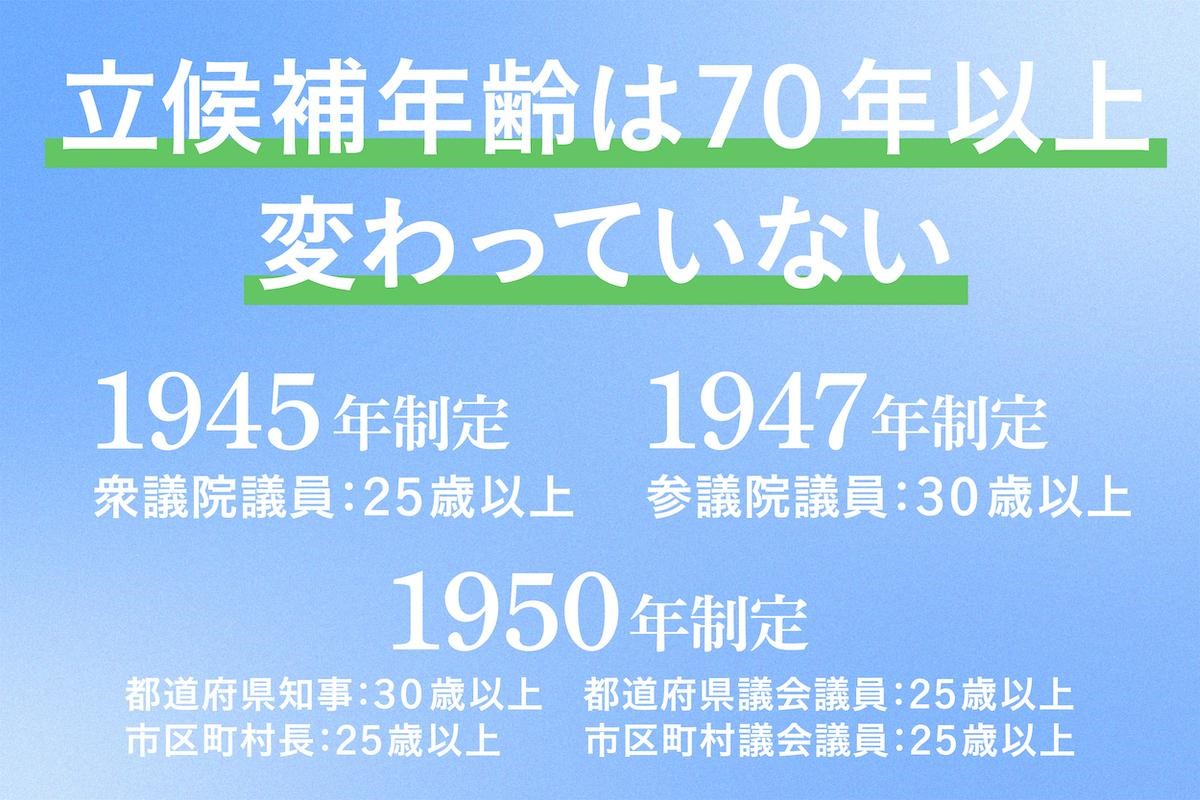
現在、私たち有権者の代表として議会にいるのはほとんどが中高年です。その平均年齢はほぼ60歳と国民全体の平均年齢からかけ離れており、日本に住む全ての人に関わる重要な事項が一部の属性に偏った人たちのみで決定されています。
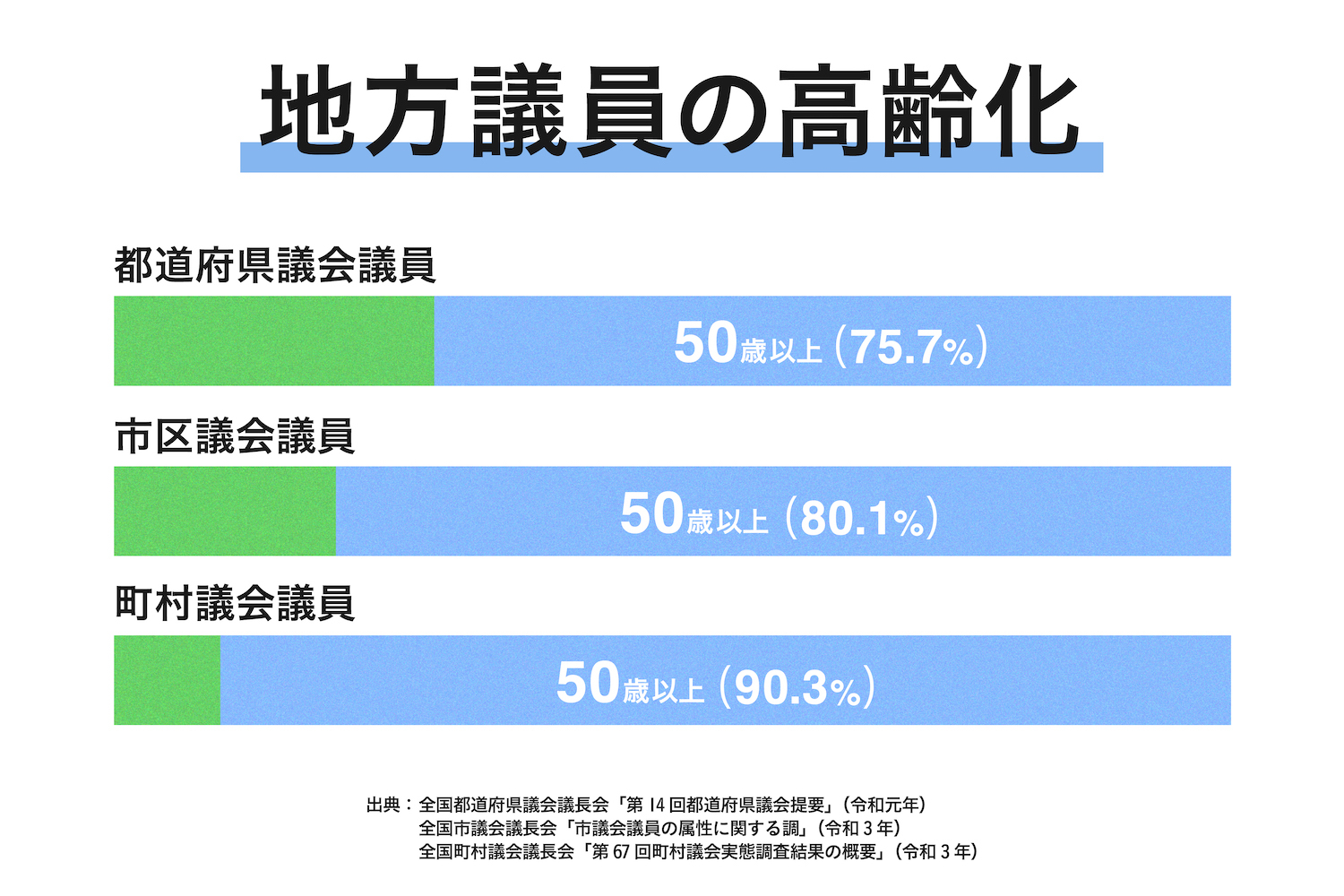
40代で若手議員と言われ、20代、30代との世代間のギャップは当然のこととされています。当事者としての若者の声は政治の場で消化されることなく蒸発しているのです。それは若者の政治への無関心さも助長してしまう深刻な問題です。若者の政治離れや投票率の低さが大きく問題視されますが、こうした政治制度にも問題があると考えます。
多くの人が18歳や22歳の卒業をきっかけにファーストキャリアを選ぶ時代ですが、そのタイミングで「政治家」という職業は選ぶことができません。現行の公職選挙法が定める立候補年齢のままで実際に立候補しようとした場合、25歳となれば働き始めて数年が過ぎた時期に、また30歳となれば結婚や出産を経て幼い子を育てている時期に当たるかもしれません。こうした流動的なライフステージの最中、選挙に立候補できる年齢に達したとしても、それまでのキャリアをあるいは中断し、あるいは捨ててすぐに立候補するのは、落選しても戻ることのできる強固な基盤がある場合を除き簡単ではありません。立候補年齢が引き下げられ、ファーストキャリアとして政治家を選択することができれば、小さなリスクで決断することが可能となります。
国際的に見ても日本の立候補年齢は高すぎる
世界的に見てもOECD各国の中で立候補年齢を25歳以上としている国は少数派です。36カ国のうち21カ国(約60%)は立候補年齢を18歳に、9カ国(25%)は21歳に設定しており、21歳未満と定める国々が全体の85%を占めています。
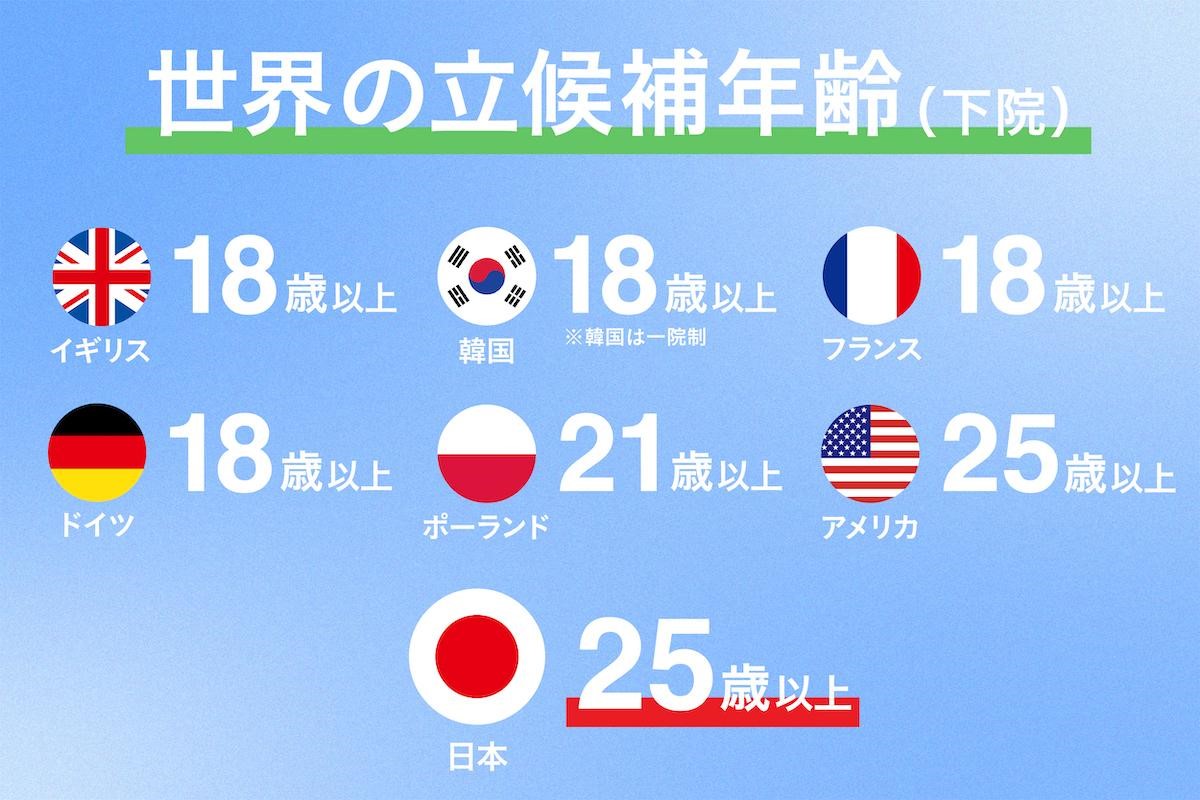
実はこれらの国も当初から立候補年齢を下げていたわけではありません。ここ数十年の間に相次いで若者に立候補を認める制度改正がなされてきたのです。
例えば、イギリスでは、2004年に選挙委員会が「①国際的には被選挙権年齢と選挙権年齢を一致させている例があること、②公選職に関心がありその職務を 十分果たすことのできる 21 歳未満の若者がいるかもしれないこと、③被選挙権年齢の規定により包括的に立候補を規制しなくても、選挙人は選挙を通じて公選職にふさわしい人物か否かを決められること」等を理由に立候補年齢の引き下げを勧告し、これを受けて立法府は2006年の法改正で立候補年齢を21歳から18歳に引き下げました。
ドイツやフランスでは、1974年と2011年に、成人年齢又は選挙権年齢と立候補年齢を同一にする立法により立候補年齢が引き下げられました。
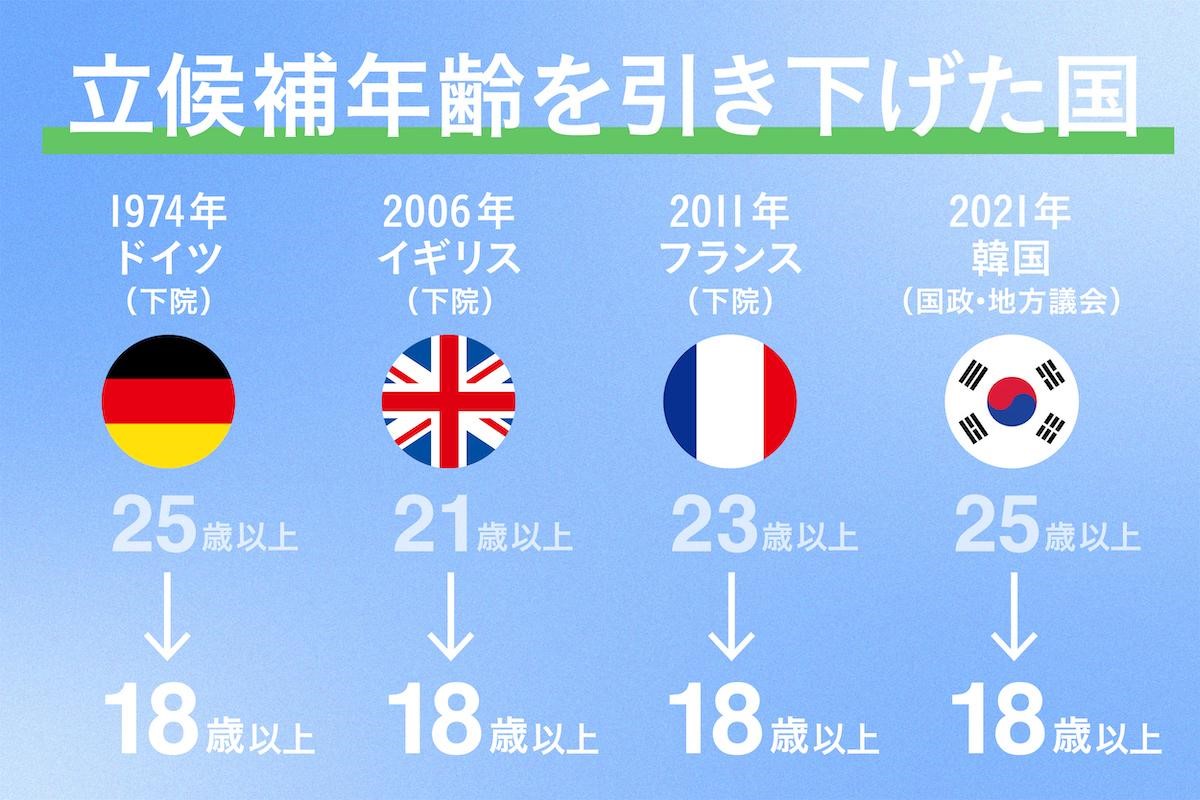
当然ですが、これらの国で立候補年齢が引き下げられたことにより何らかの弊害が生じたなどということはありません。むしろ、どの国でも、立候補年齢の引き下げにより若い世代の政治への関心やコミットが従来より高まったと報告されています。
つまり、立候補年齢を25歳や30歳に維持し続ける合理的な理由はほとんどないのです。この点について引き下げ反対の立場からは、若者には知識・経験・分別が足りないなどと主張されますが、これは典型的な偏見です。若者だというだけで例外なく一律に劣っているとみなされることに合理的な根拠はありません。
なぜ裁判?
これまでにも立候補年齢(被選挙権)の引き下げを求めて政治家への働きかけが行われてきました。2016年の成人年齢引き下げの際にも、合わせて立候補年齢を引き下げるべきとの声が上がりましたが、結局それから7年が経過した今もなお立候補年齢は引き下げられていません。野党の多くは引き下げを求めていますが与党は全く具体的な政治日程に乗せようとしません。18歳から25歳の若者は人口の2割以下と現代の日本社会では少数派に属します。中高年が圧倒的多数を占める現職議員にとって、直接の支援者の多くは自分たちと同世代であり、若者の声を聞くメリットはあまり生じません。それどころか、現職の政治家にとって立候補年齢の引き下げはライバルを増やすことに繋がるためデメリットとすらいえます。構造的に現職の議員が率先して改正に動くことは期待しづらいのですが、かといってこの複雑な激動の社会において、若者の政治参加が選挙の重要な争点となることは期待できません。つまり、立法での解決があまり期待できないのです。このような問題こそ、司法において議論されるべきです。私たちは証拠と論理を武器に裁判という手続きを通じて制度の是正を求めます。
原告たちの思い
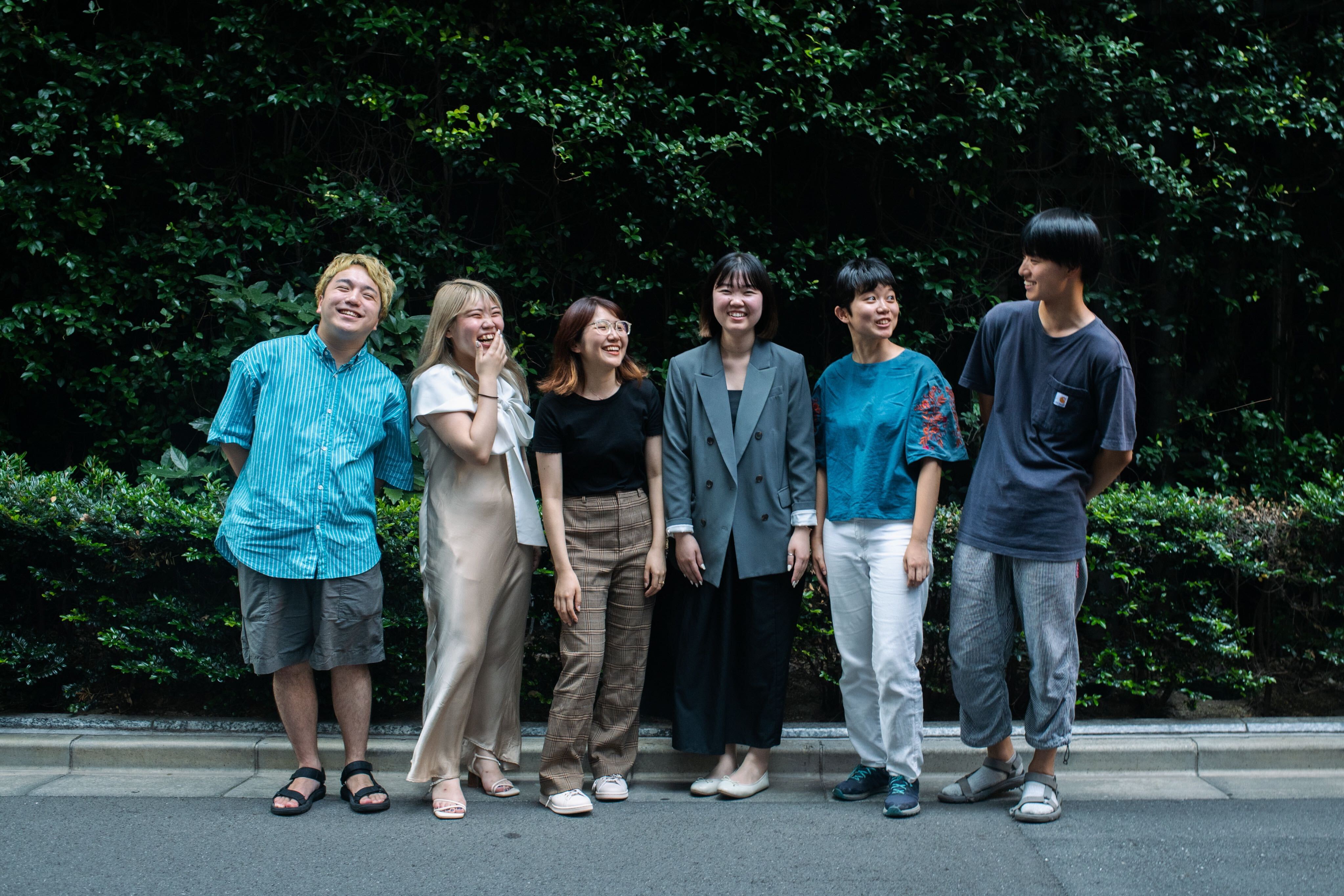
久保遼(19) /大学生
地域社会という視点から様々な社会問題に対して活動する中で、特に地方における議員の多様性の無さは、若者の声の届きにくさ、政治への無関心さを助長する深刻な問題であると感じています。そのような思いから、この活動に参加することを決めました。
中村涼夏(21)/大学生
若者の声に耳を傾けるだけでなく、届いて変えられる政治がなぜ存在しないのか。気候危機と向き合い、地方に住みながら感じることです。「日本の政治だから」という理由で諦めることなく、「若者だから」の理由で蔑ろにされないために原告になることを決意しました。
中村涼香(23)/大学生
能力や経験値は年齢に比例しないにも関わらず、現行のルールは若者の政治参加を制限しています。高齢化が進む社会で私たち若い世代の声が社会に届く仕組みを早急に作る必要があります。これからの未来を生きる私たちにも選択権があるのは当然のことだと考えます。
能條桃子(25)/一般社団法人NO YOUTH NO JAPAN代表理事・FIFTYS PROJECT代表
2019年デンマーク留学中、21歳女性の国会議員の存在に感銘を受け団体を設立、若い世代の政治参加を促進する活動に邁進してきました。投票率が低い理由を若者の責任と矮小化せず、若い世代がいない政治にも問題があると提起をしたいと思い、企画・参加しています。
Chico.(23)/Sophies代表
昨今あちこちで叫ばれる若者の政治離れ。大人たちは「最近の若者はこれだから。」と言いますが、若者が興味を持てない社会背景に目を向け、若者が自ら立ち上がれる土台創りが重要だと思います。日本の未来は限られた大人ではなく、あらゆるセグメントの人々が交わり対話しながらアップデートされる社会であることを望みます。
吉住海斗(23)/合同会社トンボ代表社員
多くの人が18歳や22歳で”卒業”をきっかけにファーストキャリアを選ぶ時代。そのタイミングで政治家を選べないことは、現行の選挙制度の大きな欠陥であると感じていました。そんな背景もあり今回の公共訴訟、強く共感し原告として活動に参加させていただきます!
寄付のお願い
教育、先端技術、雇用、福祉、メンタルヘルス、環境問題、安全保障、ジェンダー、多様性など様々な問題が複雑に絡み合う社会は限られた大人たちだけでなく、あらゆる背景を持つ人々が交わり対話しながらアップデートされていく必要があります。今回のムーブメントを通して、戦後変わらない立候補年齢についても社会全体で議論し、アップデートされることを期待します。
社会の一員である若い人が直接関わって、自らの手で変えられる政治を実現するためにご支援のほど、よろしくお願いいたします。
資金の使途
- 訴訟費用:印紙代・コピー代などの実費費用。
- 学者に依頼する意見書費用:専門的な分野ですので、憲法学者や行政法学者等の専門家に意見書を執筆していただくことを予定しています。
- 海外の知見の証拠化:海外の専門家や現職議員などからヒアリングをしたり、意見書を提出していただくことを検討しています。これには通常の謝礼の他翻訳費用も必要となります。
- 弁護団、原告などの交通費:訴訟は東京で行います。原告や弁護団の一部が地方から東京での裁判に出頭する際の交通費、専門家の方などに東京にお越しいただく際の交通費を寄付金から支出する予定です。
- イベント開催・広報費用:この裁判に関するイベントや広報費用にも寄付金を用いたいと考えています。
- 弁護士費用:弁護団員の着手金、成功報酬、出張日当等に活用したいと考えています。
弁護団について
戸田善恭(主任)法律事務所LEDGE
亀石倫子 法律事務所エクラうめだ
谷口太規 東京パブリック法律事務所
西愛礼 しんゆう法律事務所
井桁大介 宮村・井桁法律事務所
弁護団からのメッセージ
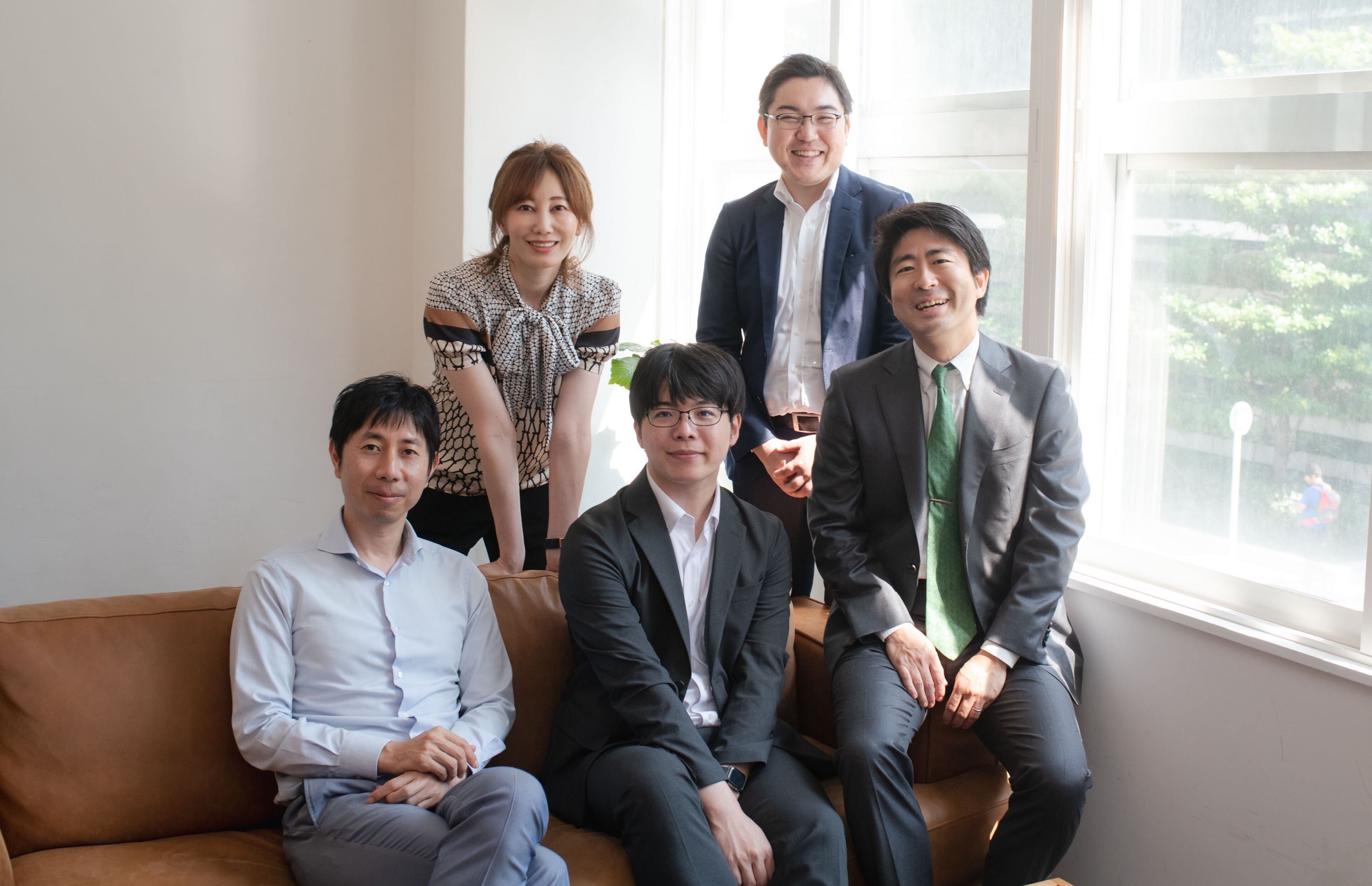
このような年齢制限が設けられたのは約70年前のことです。この間、国内外で、多様な意思を反映することは充実した民主主義に資するとの考えや、若者の自己決定権を尊重する動きが強まりました。こうした流れを受けて、日本でも2015年には選挙権年齢を18歳に、2018年には成人年齢を18歳に引き下げる法律が制定されています。選挙権年齢や成人年齢が引き下げられた際、立候補年齢を引き下げるべきだという声が多く出ましたが、具体的な立法の動きはありません。
立候補の自由は憲法の基本理念である国民主権原理の要請であり、合理的理由なく奪われてはならない憲法上の基本的人権です。25歳又は30歳に至っていなくても大人より優れた若者たちが数多くいることを私たちは知っています。この裁判では、裁判という公正・公平な議論を通じ、若者=大人より経験・能力等が低いという社会通念の是非を問うていきたいと考えています。
LEDGEについて
LEDGEは、特定の公共訴訟を支えるために作られた、各種専門家によるチームです。本訴訟はLEDGEの支援を受けています(本訴訟の弁護団の一部はLEDGEのメンバーです。)
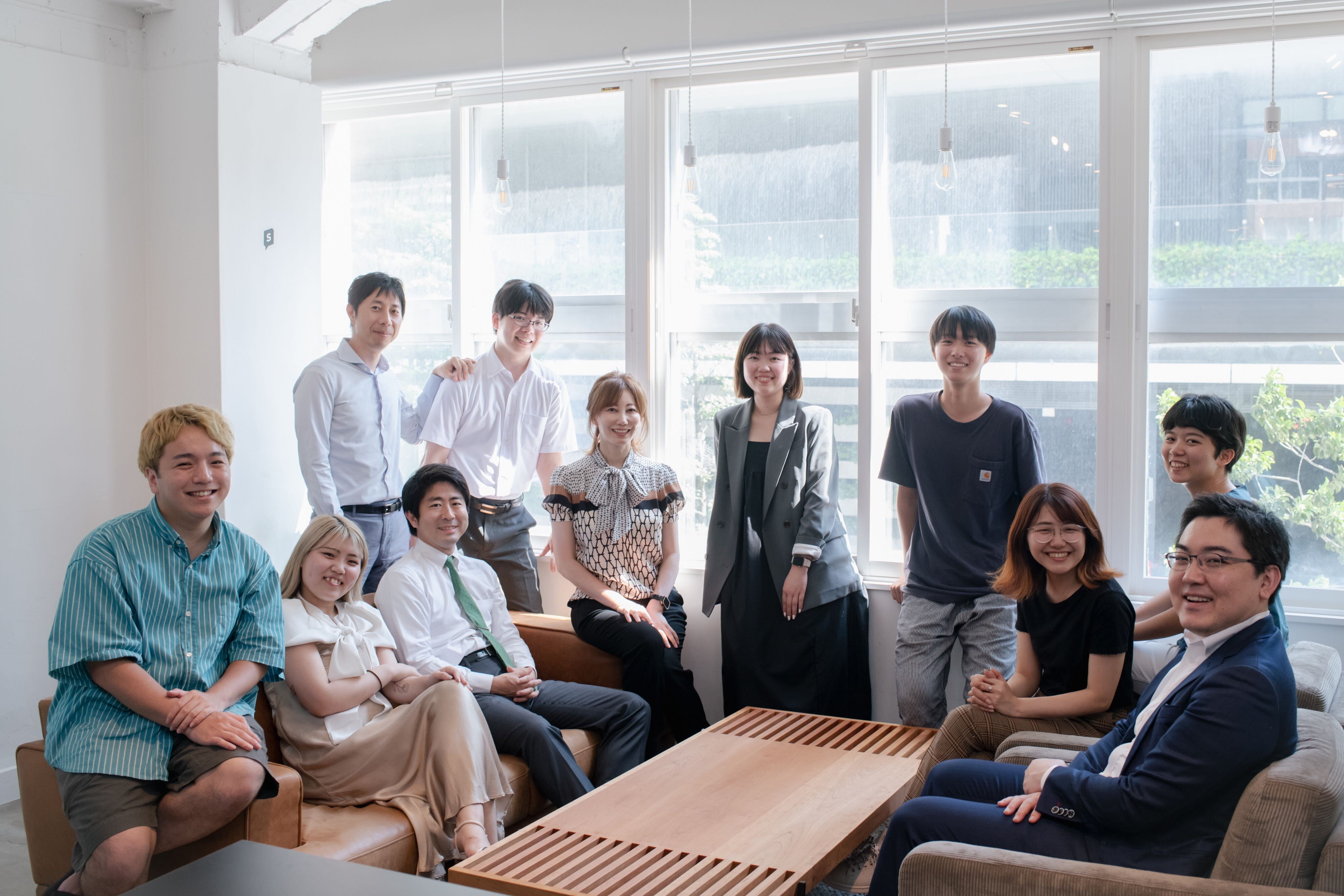
|
立候補年齢を引き下げるためのプロジェクト ウェブサイト|Project for Lowering the Age of Candidacy Website |
Why is the current age of candidacy a problem?
We demand lowering the age of candidacy (the right to be elected) through legal proceedings. Currently, the age of candidacy in Japan remains at 25 years old and 30 years old, unchanged since the post-war period.
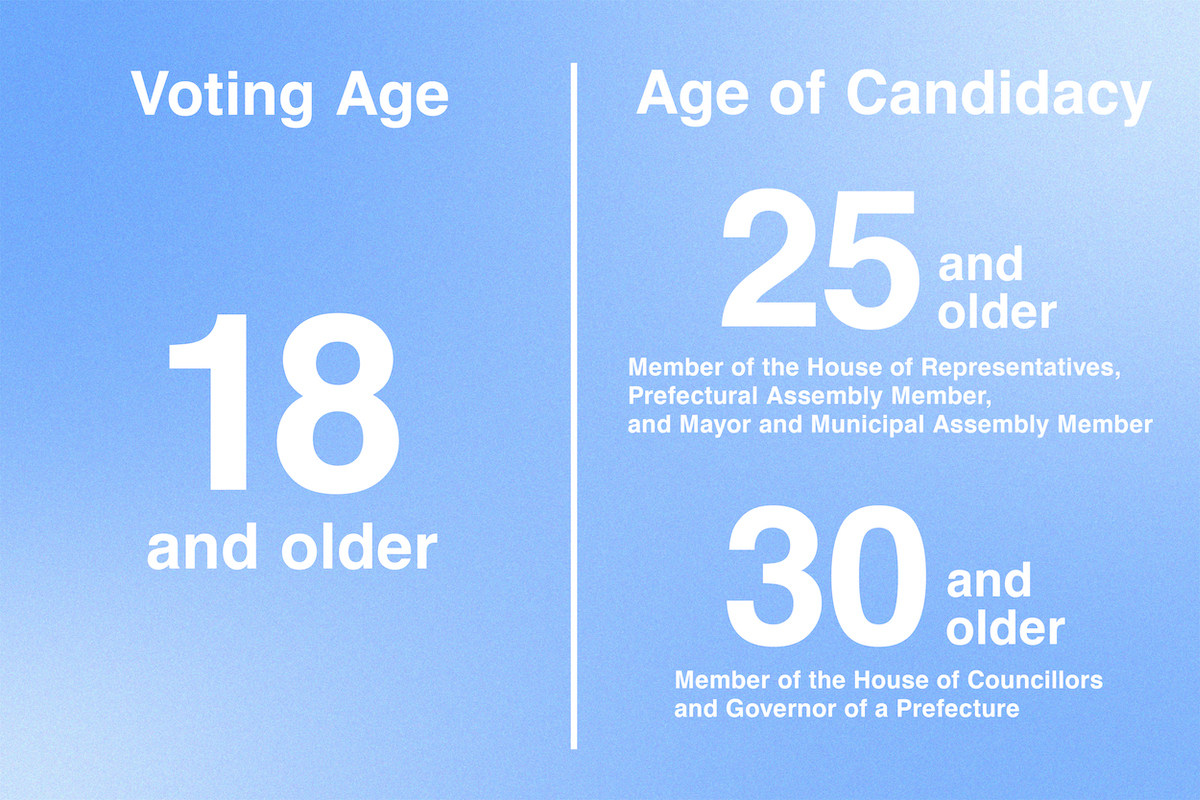
Over 70 years have passed since the post-war period, and society has undergone significant changes. In 2016, the Public Offices Election Act was amended to allow voting from the age of 18. However, the age of candidacy remains unchanged, continuously limiting the direct political participation of young people. Furthermore, it is worth noting that no one can provide a rational explanation as to why the age of candidacy must be set at 25 and 30 years old.
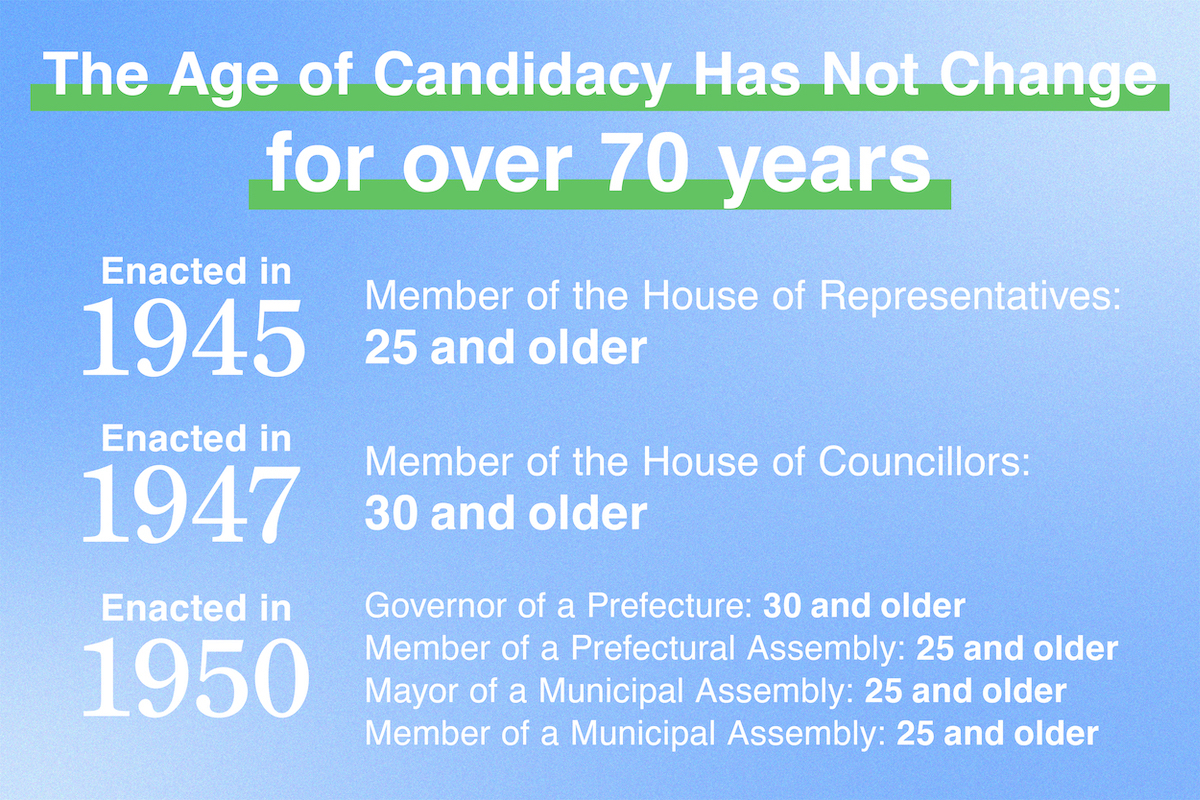
Currently, the majority of representatives in parliament, who are supposed to represent us as voters, are predominantly middle-aged and elderly. Their average age is nearly 60, which significantly deviates from the overall average age of the population. As a result, important matters affecting all people living in Japan are being decided solely by individuals with certain characteristics.
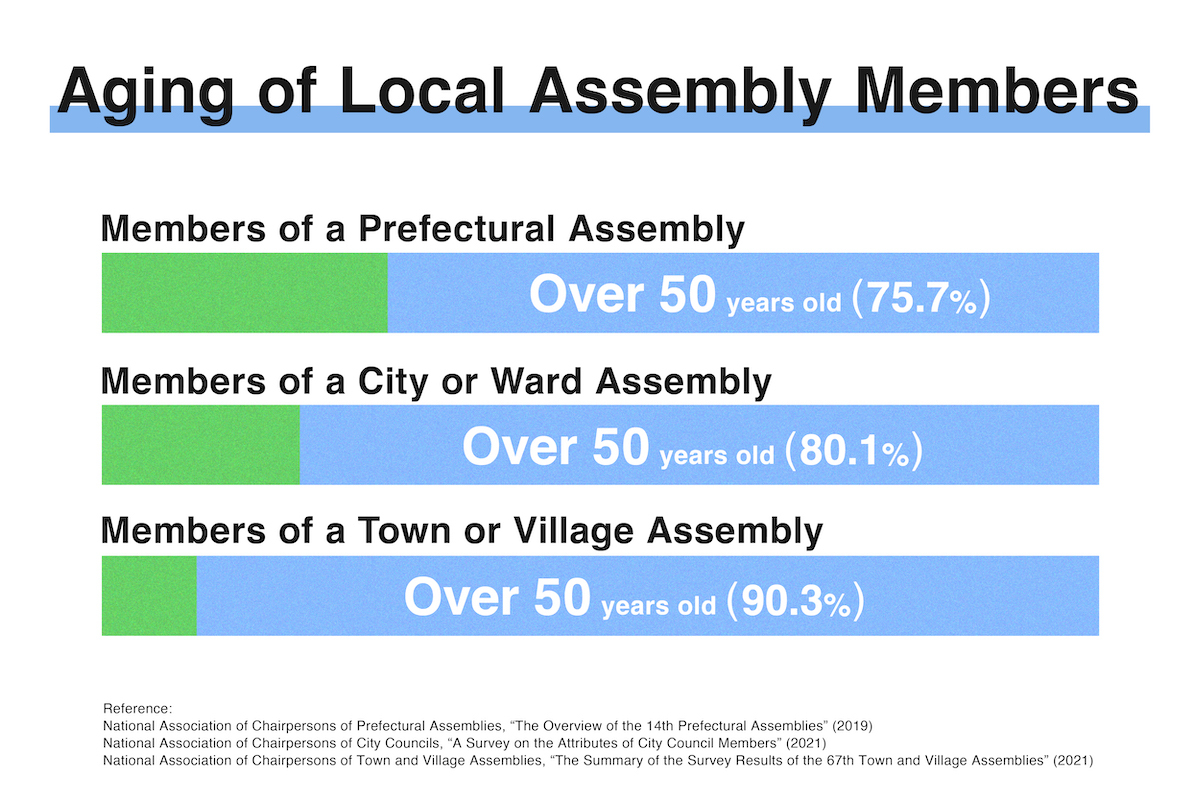
Politicians in their 40s are called young, and it is considered natural for them to have a generation gap with those in their 20s and 30s. The voices of young people as stakeholders often evaporate without being heard in the political arena. This is a serious problem that not only reinforces the indifference of young people towards politics but also contributes to their disengagement. The decline in youth political participation and voter turnout is widely recognized as a significant problem, but we also believe that there are problems within the political system itself.
In an era where many individuals choose their first career at the age of 18 or 22 after graduating from schools, the option of pursuing a profession as a "politician" is not available at this time. If one were to actually run for office under the current age requirements specified by the Public Offices Election Act, they will have had several years of work experience when they reach the age of 25, and at 30, they may be in the stage of marriage, childbirth, and raising young children. During these dynamic life stages, even if one reaches the eligible age to run for office, it is not easy to immediately do so, as it often requires sacrificing or interrupting their current career, unless they have a solid foundation to fall back on in the event of losing the election. Lowering the age of candidacy would allow young people to choose a career as a politician as their first choice with less risk involved.
Even from an international perspective, Japan's age of candidacy is excessively high.
Globally, countries within OECD that set the minimum age for candidacy at 25 years of age or older are in the minority. Out of 36 countries, 21 countries (approximately 60%) have set the minimum age for candidacy at 18 years, while 9 countries (25%) have set it at 21 years. Countries that establish the minimum age below 21 years account for 85% of the total.
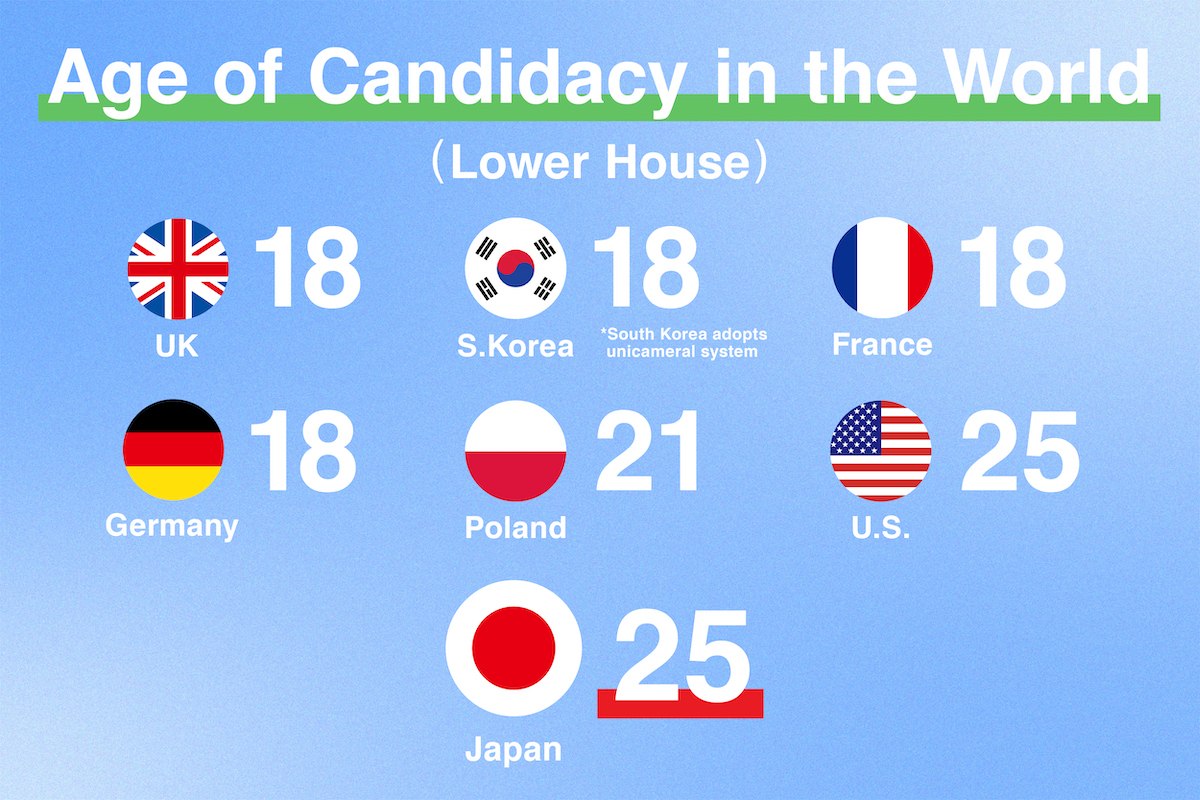
Actually, these countries did not initially have these lower minimum age requirements for candidacy. It has been in recent decades that successive reforms have been made to allow young people to run for office.
For example, in the UK, in 2004, the Electoral Commission recommended lowering the age of candidacy for reasons such as: 1) there are examples internationally where the age of candidacy aligns with the voting age, 2) there may be individuals under the age of 21 who have an interest in elected positions and are capable of fulfilling their duties adequately, and 3) even without comprehensive restrictions on candidacy based on the age, through elections, voters can determine whether a candidate is suitable for public office. In response to this recommendation, the legislative body lowered the age of candidacy from 21 to 18 through a law amendment in 2006.
In Germany, the age of candidacy was lowered through legislation that aligned the age of adulthood or the voting age with the age of candidacy in 1974, while in France, a similar legislation was enacted in 2011.
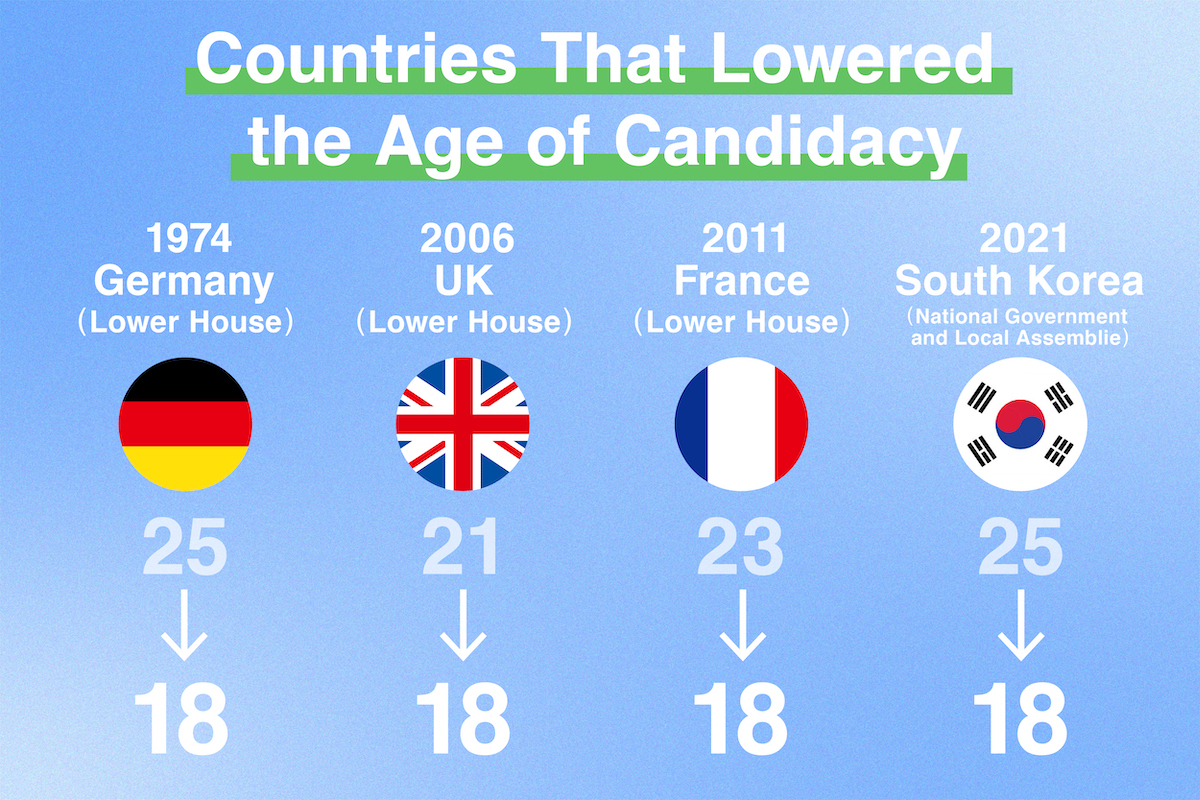
Of course, there have been no adverse effects reported as a result of lowering the age of candidacy in these countries. On the contrary, in every country, it has been reported that lowering the age of candidacy has increased the interest and commitment of young people in politics.
In other words, there are very few rational reasons to maintain the age of candidacy at 25 or 30. Those who oppose lowering the age often argue that young people lack knowledge, experience, and discretion. However, this is a typical prejudice. There is no rational basis for considering all young people to be uniformly inferior simply because of age.
Why a Lawsuit?
Efforts have been made in the past to advocate for the lowering of the age of candidacy (the right to be elected) through political channels. Even during the lowering of the age of adulthood in 2016, there were voices calling for a simultaneous reduction in the age of candidacy. However, seven years have passed since then, and it has still not been lowered. While many opposition parties are demanding a reduction, the ruling party has shown no intention of including it in any specific political agenda. In modern Japanese society, where individuals aged 18 to 25 account for less than 20% of the population, they belong to a minority group. For incumbent politicians who are predominantly middle-aged and older, their direct supporters are often of the same generation, and there is little incentive for them to listen to the voices of young people. On the contrary, lowering the age of candidacy would increase competition for incumbent politicians, leading to disadvantages for them. It is unlikely that they will take the lead in initiating reforms structurally, and in this complex and rapidly changing society, it is also unlikely that young people's political participation will become a significant electoral issue. In other words, a legislative solution is not highly expected. It is precisely for these kinds of issues that it should be discussed within the judicial system. We seek to rectify the system through the legal process, armed with evidence and logical arguments.
Comments from the Plaintiffs
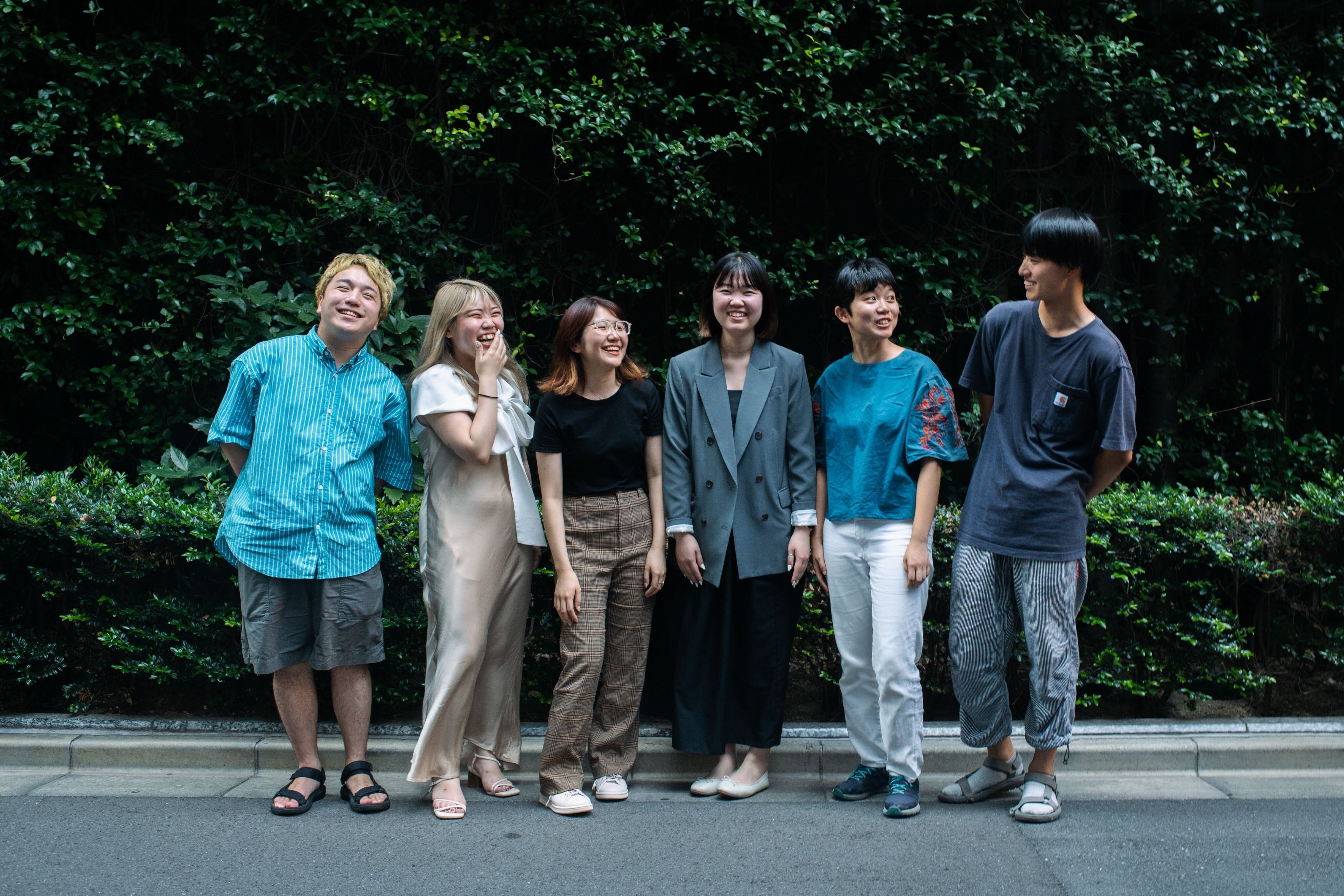
Haruka Kubo (19) / University Student
Through my activities addressing various social issues from the perspective of local communities, I have felt that the lack of diversity among local politicians is a serious problem that hinders the voices of young people from being heard and contributes to political apathy. It is with such thoughts that I have decided to participate in this campaign.
Suzuka Nakamura (21) / University Student
I wonder why there is no politics that not only listens to the voices of young people but also acts upon them. It is something I feel while facing the climate crisis and living in a local community. I have decided to become a plaintiff so that I will not be disregarded simply because I am a young person and will not give up with the excuse that "it's the politics of Japan."
Suzuka Nakamura (23) / University Student
Why isn't there a politics that not only listens to the voices of young people but also takes action to make a difference? This is what I wonder, confronting the climate crisis and living in a rural community. I have decided to become a plaintiff instead of giving up by accepting the fact that “because it’s Japanese politics” and being disregarded “because I am young.”
Momoko Nojo (25) / Representative Director of NO YOUTH NO JAPAN & Representative of FIFTYS PROJECT
During my study abroad in Denmark in 2019, I was impressed by the presence of a 21-year-old female member of parliament, which led me to establish an organization and engage in activities to promote the political participation of young people. I want to raise awareness that the low voter turnout is not solely the responsibility of young people but also a problem with politics that lacks representation from the younger generation.
Chico (23) / Representative of Sophies
There is a growing concern about young people's disengagement from politics these days. Adults often say, "It's because of today's young people." However, I believe it is important to look at the social background that prevents young people from being interested and to create a foundation for young people to stand up on their own. I hope that Japan's future will be a society where people from all segments come together, interact, and update.
Kaito Yoshizumi (23) / Representative Employee of Tonbo
In this day and age, many people choose their first career at the age of 18 or 22, and I have always felt that not being able to choose a career as a politician at that time is a significant flaw in the current electoral system. With that background, I strongly resonate with this public litigation and will actively participate as a plaintiff!
Request for Donations
In a society where various issues such as education, advanced technology, employment, welfare, mental health, environmental problems, security, gender, and diversity are intricately intertwined, it is necessary for people from diverse backgrounds, not just limited to a few adults, to come together, engage in dialogue, and update the society. Through this movement, we hope to facilitate a societal-wide discussion on the unchanged age of candidacy since the post-war era and to see a change.
We kindly ask for your support in realizing a politics that can be changed by young individuals who are integral members of society and can directly participate in shaping it. Thank you for your consideration and support.
Use of Funds
- Litigation Expenses: Actual expenses such as stamp fees and photocopying costs.
- Expert opinion fees: We plan to seek the assistance of experts in constitutional law and administrative law, among others, for written opinions in their respective fields.
- Documentation of international expertise: We are considering conducting interviews or asking for written opinions from international experts and current lawmakers abroad. This may require translation costs in addition to the usual compensation.
- Transportation expenses for the legal team and plaintiffs: The lawsuit will take place in Tokyo. We intend to cover the transportation expenses for plaintiffs and part of the legal team traveling from other regions to attend the trial, as well as the transportation expenses for experts visiting Tokyo.
- Event organization and publicity costs: We would like to allocate some of the donated funds towards organizing events and publicizing the lawsuit.
- Legal fees: We intend to utilize the funds for lawyer fees, including retainers, success-based fees, and daily allowances for business trips.
About Legal Team
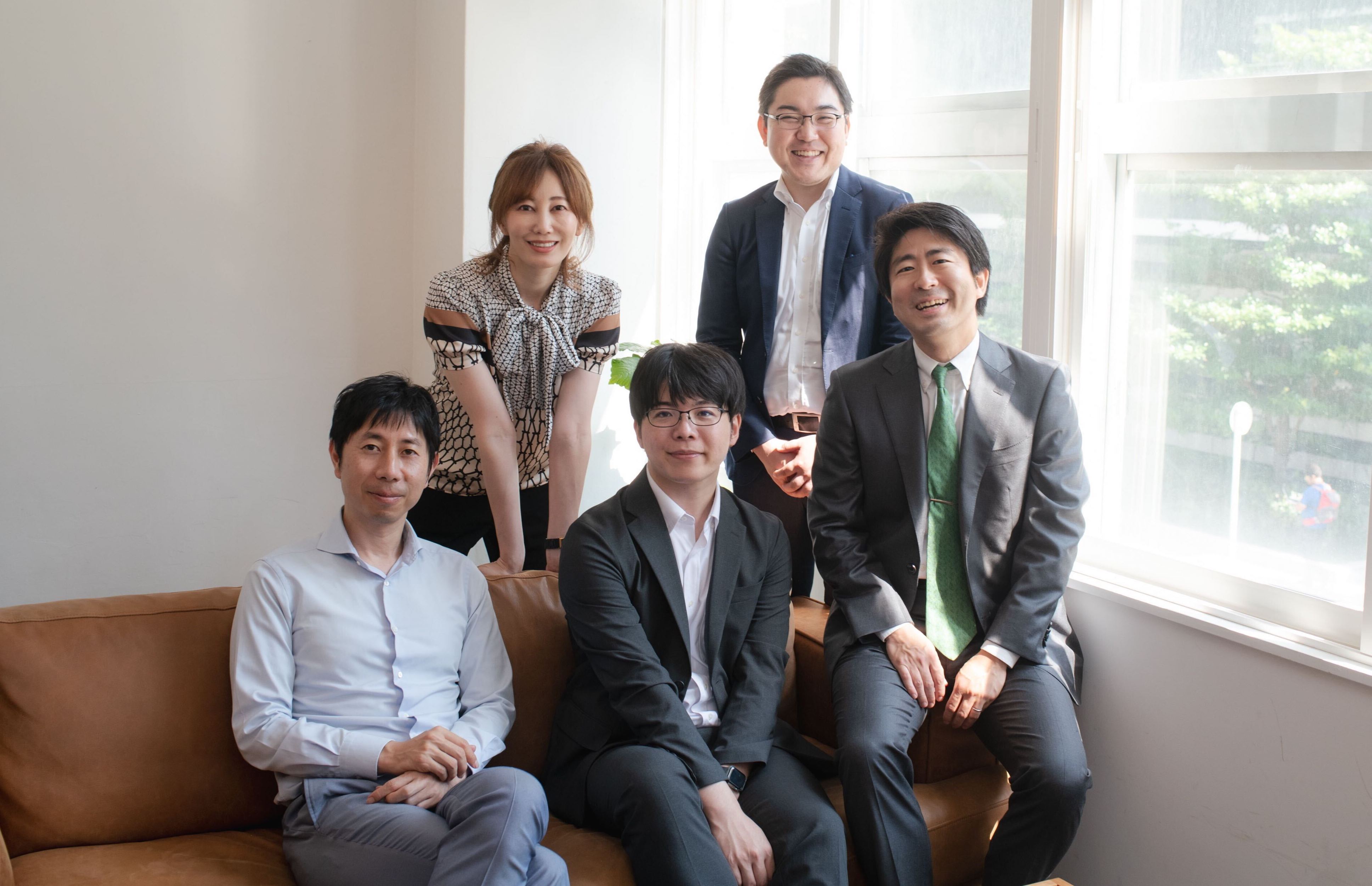
TODA, Yoshitaka(Chief)
KAMEISHI, Michiko
TANIGUCHI, Motoki
NISHI, Yoshiyuki
IGETA, Daisuke
Message from Legal team
The age of candidacy was established approximately 70 years ago. Since then, both domestically and internationally, there has been a growing belief that reflecting diverse perspectives contributes to a robust democracy and a movement to respect young people's right to self-determination. In line with this trend, Japan enacted a law in 2015 to lower the voting age to 18 and another in 2018 to lower the age of adulthood to 18. When the voting age and the age of adulthood were lowered, many voices called for a corresponding reduction in the age of candidacy, but there have been no concrete legislative actions.
The right of candidacy is a fundamental human right protected by the principle of popular sovereignty, which is a basic tenet of the constitution and should not be unjustifiably deprived without rational grounds. We are aware that there are numerous young individuals who possess superior qualities and capabilities compared to adults, even if they have not reached the age of 25 or 30. In this litigation, we aim to question the societal notion that young people are inherently less experienced or capable than adults through fair and equitable discussions within the judicial process.
About LEDGE
Public litigation is the approach of using the judicial system to change unjust systems and practices in society. LEDGE is a team of various experts created to support public litigations. This lawsuit is supported by LEDGE. (Some members of the legal team in this lawsuit are LEDGE members.)
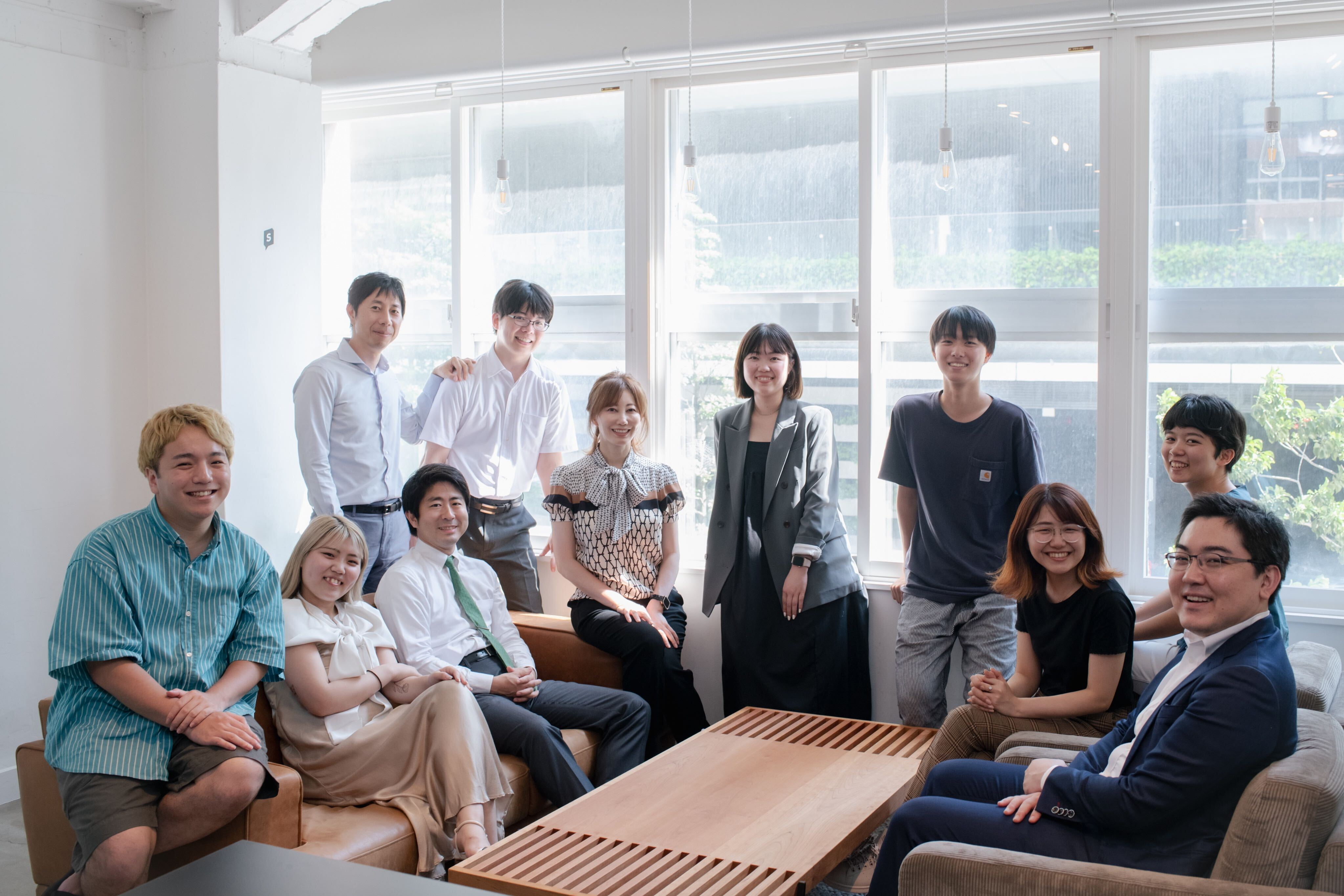
|
立候補年齢を引き下げるためのプロジェクト ウェブサイト|Project for Lowering the Age of Candidacy Website |
関連コラム
-
2023. 12. 27
-
2023. 10. 11
あなたにおすすめのケース Recommended case for you
- 外国にルーツを持つ人々 Immigrants/Refugees/Foreign residents in Japan
- ジェンダー・セクシュアリティ Gender/Sexuality
- 医療・福祉・障がい Healthcare/Welfare/Disability
- 働き方 Labor Rights
- 刑事司法 Criminal Justice
- 公正な手続 Procedural Justice
- 情報公開 Information Disclosure
- 政治参加・表現の自由 Democracy/Freedom of Expression
- 環境・災害 Environment/Natural Disasters
- 沖縄 Okinawa
- 個人情報・プライバシー Personal information/Privacy
- アーカイブ Archive
- 全てのケース ALL
